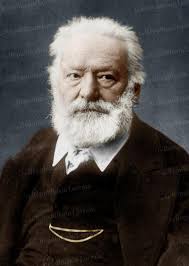Hugo, Victor: Les Miserables



In 1804, a French priest, Monsieur Myriel, visited Paris to see the Cardinal about his parish. He found himself staring at Napoleon, also in Paris to visit the Cardinal (his uncle). Napoleon spoke brusquely: “Who is this good man looking at me?” M. Myriel replied: “Sire, you are looking at a good man, and I at a great one. May we both be the better for the occasion.”
Myriel found himself not only raised from priest to bishop, but inhabiting the bishop’s palace. Neither wanting nor needing a palace, he gave up the space to a hospital which needed more beds and found himself humbler lodgings instead, no better than he’d had before.
Months later, he welcomed a convict to his home who had been shown the door from all the restaurants and inns at which he had sought food and shelter, feeding him and providing him with a bed. The convict stole his silver and stole into the night, only to be captured by the police and returned to M. Myriel. The bishop insisted he had given the convict the silver and asked why the convict had not taken the silver candlesticks as well, which he had also given him, turning the convict’s world upside down, struck as he was by the concept of returning good for bad.
So begins one of our greatest novels, also one of our longest, its size matched only by the greatness of its heart, turning this theme of paying it forward into an aria of forgiveness. Jean Valjean, the convict, is a Christlike figure like no other in literature, not Lord Jim, not Prince Myshkin, not even Sydney Carton. I finished reading it recently, only to lie in my armchair, book to my breast, becoming as much one with the book as I could, sobbing and sighing, grateful and grieving, for the lives in the book as much as the lives outside.